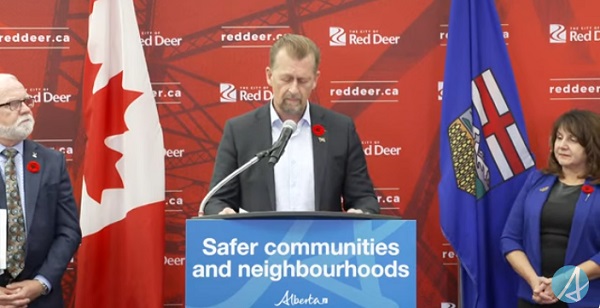Alberta
New Sheriffs unit to enhance public safety in Red Deer and Central Alberta

A new team of Alberta Sheriffs will work alongside police to keep crime out of central Alberta communities by targeting problem properties.
Since 2023, Alberta’s government has invested more than $27 million to help fight crime throughout the province. Building on these efforts, the government is now expanding the Alberta Sheriffs’ Safer Communities and Neighbourhoods (SCAN) unit with the creation of a new team of investigators in Red Deer. The creation of the Red Deer SCAN team is the latest in a series of measures aimed at enhancing public safety and increasing the Alberta Sheriffs’ ability to support police throughout the province.
The move puts more resources on the ground with a team of qualified experts who will investigate properties where illegal activity has been reported and shut them down through court orders when needed. The Red Deer SCAN team – made up of four Alberta Sheriffs – joins existing SCAN teams in Calgary, Edmonton, and Lethbridge, which have proven immensely effective in working alongside local police to shutter problem properties throughout the province.
“Alberta’s government will always maintain a zero-tolerance stance toward crime of any kind, and the expansion of the Alberta Sheriffs’ SCAN unit reflects that. With the creation of a new SCAN team in Red Deer, we’re expanding the unit’s coverage even further and putting more boots on the ground where they’re needed. Let this be a message to all criminals: you are not welcome here. Communities in the Red Deer area have a right not to be plagued by drug and other criminal activity that create dangerous environments, and Alberta’s government will do whatever it takes to keep people safe.”
The Sheriffs’ SCAN unit operates under the Safer Communities and Neighbourhoods Act, which uses legal sanctions and court orders to hold owners accountable for illegal activity happening on their property, such as drug trafficking, human trafficking and child exploitation. SCAN augments and supports local police to both investigate and close properties where evidence of criminal activity has been confirmed.
“Ensuring safety for law-abiding Albertans is of utmost importance for Alberta’s government and requires a comprehensive approach to effectively combat and prevent criminal activity. This involves enhancing law-enforcement resources, fostering community engagement, implementing crime prevention programs, and promoting collaboration between Alberta Sheriffs and local police. This SCAN team is a game-changer in central Alberta and puts criminals on notice that they are not welcome here.”
“The Safer Communities and Neighbourhoods Act holds property owners accountable for activities on their property that threaten public safety. Alberta’s SCAN teams support policing efforts by addressing illegal activities on these properties. This additional team will enhance RCMP community safety programs.”
When a community member reports a problem property to SCAN, the unit begins an investigation. Once the investigation confirms the activity, investigators contact the property owner to try and resolve the issue informally. If informal efforts are unsuccessful, SCAN can apply to the courts for a community safety order to impose restrictions and conditions on the property and its owner, which could include closing the property for up to 90 days. Any criminal activity uncovered when dealing with these properties is turned over to the police to investigate.
“Over the years, SCAN’s impact on community safety has been profound. More often than not, we see individuals in these problem properties carrying out drug operations and other criminal activities beside homes, schools, playgrounds and other places where Albertans’ safety should never be in question. Crime has no place in any Alberta neighbourhood, and we look forward to working with our policing partners in the Red Deer area to help keep central Alberta communities safe.”
SCAN continues to see tremendous success, having closed problem properties in Lethbridge, Calgary, Spruce Grove and Medicine Hat in the last six months alone. Since May 2024, Alberta’s government has publicly announced the closure of seven problem properties by SCAN, including three in Calgary, two in Lethbridge, and one each in Spruce Grove and Medicine Hat.
“Creating a safer environment for our citizens improves the overall quality of our community in Red Deer. I would like to take this opportunity to thank Alberta’s government, SCAN and all our law enforcement partners who work tirelessly every day to keep our communities safe. This is great news for the City of Red Deer, and together, we can make our community safer. I encourage residents to report any suspicious activity to the SCAN unit.”
The Red Deer SCAN team’s operational boundaries encompass the city of Red Deer and its surrounding communities and rural areas, providing coverage to the central area spanning Ponoka to the north and Olds to the south.
Alberta
Canada’s heavy oil finds new fans as global demand rises

From the Canadian Energy Centre
By Will Gibson
“The refining industry wants heavy oil. We are actually in a shortage of heavy oil globally right now, and you can see that in the prices”
Once priced at a steep discount to its lighter, sweeter counterparts, Canadian oil has earned growing admiration—and market share—among new customers in Asia.
Canada’s oil exports are primarily “heavy” oil from the Alberta oil sands, compared to oil from more conventional “light” plays like the Permian Basin in the U.S.
One way to think of it is that heavy oil is thick and does not flow easily, while light oil is thin and flows freely, like fudge compared to apple juice.
“The refining industry wants heavy oil. We are actually in a shortage of heavy oil globally right now, and you can see that in the prices,” said Susan Bell, senior vice-president of downstream research with Rystad Energy.
A narrowing price gap
Alberta’s heavy oil producers generally receive a lower price than light oil producers, partly a result of different crude quality but mainly because of the cost of transportation, according to S&P Global.
The “differential” between Western Canadian Select (WCS) and West Texas Intermediate (WTI) blew out to nearly US$50 per barrel in 2018 because of pipeline bottlenecks, forcing Alberta to step in and cut production.
So far this year, the differential has narrowed to as little as US$10 per barrel, averaging around US$12, according to GLJ Petroleum Consultants.
“The differential between WCS and WTI is the narrowest I’ve seen in three decades working in the industry,” Bell said.
Trans Mountain Expansion opens the door to Asia

Oil tanker docked at the Westridge Marine Terminal in Burnaby, B.C. Photo courtesy Trans Mountain Corporation
The price boost is thanks to the Trans Mountain expansion, which opened a new gateway to Asia in May 2024 by nearly tripling the pipeline’s capacity.
This helps fill the supply void left by other major regions that export heavy oil – Venezuela and Mexico – where production is declining or unsteady.
Canadian oil exports outside the United States reached a record 525,000 barrels per day in July 2025, the latest month of data available from the Canada Energy Regulator.
China leads Asian buyers since the expansion went into service, along with Japan, Brunei and Singapore, Bloomberg reports. 
Asian refineries see opportunity in heavy oil
“What we are seeing now is a lot of refineries in the Asian market have been exposed long enough to WCS and now are comfortable with taking on regular shipments,” Bell said.
Kevin Birn, chief analyst for Canadian oil markets at S&P Global, said rising demand for heavier crude in Asia comes from refineries expanding capacity to process it and capture more value from lower-cost feedstocks.
“They’ve invested in capital improvements on the front end to convert heavier oils into more valuable refined products,” said Birn, who also heads S&P’s Center of Emissions Excellence.
Refiners in the U.S. Gulf Coast and Midwest made similar investments over the past 40 years to capitalize on supply from Latin America and the oil sands, he said.
While oil sands output has grown, supplies from Latin America have declined.
Mexico’s state oil company, Pemex, reports it produced roughly 1.6 million barrels per day in the second quarter of 2025, a steep drop from 2.3 million in 2015 and 2.6 million in 2010.
Meanwhile, Venezuela’s oil production, which was nearly 2.9 million barrels per day in 2010, was just 965,000 barrels per day this September, according to OPEC.
The case for more Canadian pipelines

Worker at an oil sands SAGD processing facility in northern Alberta. Photo courtesy Strathcona Resources
“The growth in heavy demand, and decline of other sources of heavy supply has contributed to a tighter market for heavy oil and narrower spreads,” Birn said.
Even the International Energy Agency, known for its bearish projections of future oil demand, sees rising global use of extra-heavy oil through 2050.
The chief impediments to Canada building new pipelines to meet the demand are political rather than market-based, said both Bell and Birn.
“There is absolutely a business case for a second pipeline to tidewater,” Bell said.
“The challenge is other hurdles limiting the growth in the industry, including legislation such as the tanker ban or the oil and gas emissions cap.”
A strategic choice for Canada
Because Alberta’s oil sands will continue a steady, reliable and low-cost supply of heavy oil into the future, Birn said policymakers and Canadians have options.
“Canada needs to ask itself whether to continue to expand pipeline capacity south to the United States or to access global markets itself, which would bring more competition for its products.”
Alberta
From Underdog to Top Broodmare

WATCH From Underdog to Top Broodmare (video)
Executive Producers Jeff Robillard (Horse Racing Alberta) and Mike Little (Shinelight Entertainment)
What began as an underdog story became a legacy of excellence. Crackers Hot Shot didn’t just race — she paved the way for future generations, and in doing so became one of the most influential producers the province has known.
The extraordinary journey of Crackers Hot Shot — once overlooked, now revered — stands as one of Alberta’s finest success stories in harness racing and breeding.
Born in humble circumstances and initially considered rough around the edges, Crackers Hot Shot overcame long odds to carve out a career that would forever impact the province’s racing industry. From a “wild, unhandled filly” to Alberta’s “Horse of the Year” in 2013, to producing foals who carry her spirit and fortitude into future generations.
Her influence ripples through Alberta’s racing and breeding landscape: from how young stock are prepared, to the aspirations of local breeders who now look to “the mare that did it” as proof that world-class talent can emerge from Alberta’s paddocks.
“Crackers Hot Shot, she had a tough start. She wasn’t much to look at when we first got her” — Rod Starkewski
“Crackers Hot Shot was left on her own – Carl Archibald heard us talking, he said ‘I’ll go get her – I live by there’. I think it took him 3 days to dig her out of the snow. She was completely wild – then we just started working on her. She really needed some humans to work with her – and get to know that people are not scary.” — Jackie Starkewski
“Crackers Hot Shot would be one of the top broodmares in Albeta percentage wise if nothing else. Her foals hit the track – they’re looking for the winners circle every time.” — Connie Kolthammer
Visit thehorses.com to learn more about Alberta’s Horse Racing industry.
-

 Business2 days ago
Business2 days agoCanada has given $109 million to Communist China for ‘sustainable development’ since 2015
-

 Crime1 day ago
Crime1 day agoPublic Execution of Anti-Cartel Mayor in Michoacán Prompts U.S. Offer to Intervene Against Cartels
-

 Automotive2 days ago
Automotive2 days agoCarney’s Budget Risks Another Costly EV Bet
-

 Business2 days ago
Business2 days agoYou Won’t Believe What Canada’s Embassy in Brazil Has Been Up To
-

 Environment2 days ago
Environment2 days agoThe era of Climate Change Alarmism is over
-

 Censorship Industrial Complex2 days ago
Censorship Industrial Complex2 days agoSenate Grills Meta and Google Over Biden Administration’s Role in COVID-Era Content Censorship
-

 Business2 days ago
Business2 days agoMystery cloaks Doug Ford’s funding of media through Ontario advertising subsidy
-

 Aristotle Foundation1 day ago
Aristotle Foundation1 day agoB.C. government laid groundwork for turning private property into Aboriginal land






